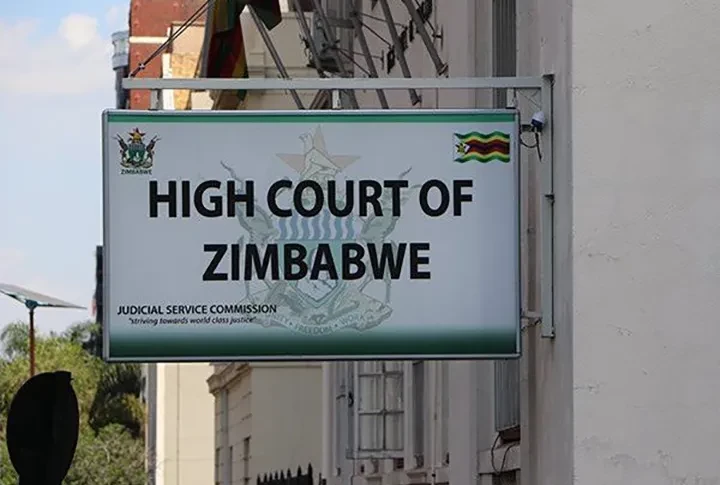
IN yet another blow to the controversial law seeking to punish Zimbabweans for alleged lack of patriotism, the High Court has ruled that sections of the Criminal Law (Codification and Reform) Act imposing stiff penalties on those accused of calling for trade boycotts or sanctions against the country are vague, wide and too broad to be understood.
The ruling came hardly a month after the High Court ruled that section 22A(3) of the same law also known as the Patriotic Act was unconstitutional.
In the latest ruling, High Court judge Justice Rodgers Manyangadze struck down section 22A(3) of the Act, which criminalised participation in meetings intended to harm Zimbabwe’s “sovereignty or national interest”.
The section also criminalises calling for a trade boycott, sanctions or attending meetings where sanctions or other policy matters against Zimbabwe are discussed.
The court found the language too vague and far-reaching, raising constitutional concerns over several fundamental rights, including freedom of assembly, association, expression, the right to a fair trial as well as citizenship and political rights.
The case was brought by journalists Valentine Maponga and Paidamoyo Muzulu as well as legal advocacy organisation Firinne Trust (trading as Veritas).
In their submissions, they argued that the law risked targeting journalists and activists for legitimate engagement in international dialogue.
Their lawyer, Tendai Biti, told the court that section 22A(3) was “hopelessly vague” and introduced an undefined standard of “intentionally partake” that lacked legal precision and opened the door to abuse.
- Mavhunga puts DeMbare into Chibuku quarterfinals
- Bulls to charge into Zimbabwe gold stocks
- Ndiraya concerned as goals dry up
- Letters: How solar power is transforming African farms
Keep Reading
Biti warned that such ambiguity could result in arbitrary arrests and a chilling effect on citizens exercising their democratic rights, especially when attending meetings where sanctions or other policy matters are discussed.
Justice Manyangadze said the lack of clarity created uncertainty around legal thresholds and could be applied inconsistently by police or prosecutors.
The judge sharply criticised the section’s imprecision, warning that it created a climate ripe for arbitrary arrests.
While section 22A(2) included a definition of “actively partake,” the disputed subsection used the term “intentionally partake” without explanation — a legislative flaw the court said could result in broad and inconsistent interpretations by law enforcement.
Of particular concern were the harsh penalties attached to the provision.
Individuals found guilty could face the revocation of citizenship, loss of permanent residency or a 15-year ban from voting or holding public office.
Justice Manyangadze described the penalties as “drastic and draconian” and inconsistent with constitutional limits.
While the court dismissed the challenge against section 22A(2) relating to meetings that consider or promote military intervention, it emphasised that legislation aimed at protecting national security should still respect the boundaries of democratic freedoms and due process.
The decision also rendered a challenge to Zimbabwe’s death penalty laws moot, noting that Parliament had recently abolished capital punishment entirely through the Death Penalty Abolition Act.
The court also noted that it is the urgent duty of the relevant ministry to rewrite the Act in a proper form that aligns with the Constitution.
Last month, the High Court ruled in favour of the Media Alliance of Zimbabwe and Zenzele Ndebele, a private citizen, who brought a case before the court, arguing that section 22A(3) and other provisions had high potential for abuse and misuse.
They contended that the sections had the effect of silencing dissenting voices and were, therefore, unfair, unnecessary and unreasonable in a democratic society.
They also said the law did not sufficiently define what constituted “wilfully injuring the sovereignty and national interest of Zimbabwe”.
The Act created the crime of “wilfully injuring the sovereignty and national interest of Zimbabwe” which effectively criminalises civil society groups and human rights defenders who criticise the government at international forums and prohibits them from seeking external avenues for accountability for rights violations.
In its ruling, the High Court stated that the drastic penalties prescribed under section 22A(3) of the Act, which include life imprisonment, death, termination of citizenship and suspensions from voting and holding public office, infringed on various sections of the Zimbabwean Constitution.
Observers have previously said the Act should be repealed in its entirety.
In 2023, President Emmerson Mnangagwa signed the Patriot Bill, which deals with wilfully injuring the sovereignty and national interest of Zimbabwe.
The law provides for severe penalties for those charged with damaging the country’s interests.
It also stipulates the execution of any person found to have advocated for international sanctions which harm the country or its people.
The Bill was widely condemned by human rights groups, including the United Nations High Commissioner for Human Rights, but sailed through the Zanu PF-dominated National Assembly and Senate, paving way for Mnangagwa to append his signature.
Zanu PF activists have defended the law as necessary to punish citizens bent on pushing a regime change agenda with the West.
United States-based opposition activist Freeman Chari, also challenged the constitutionality of the law.










